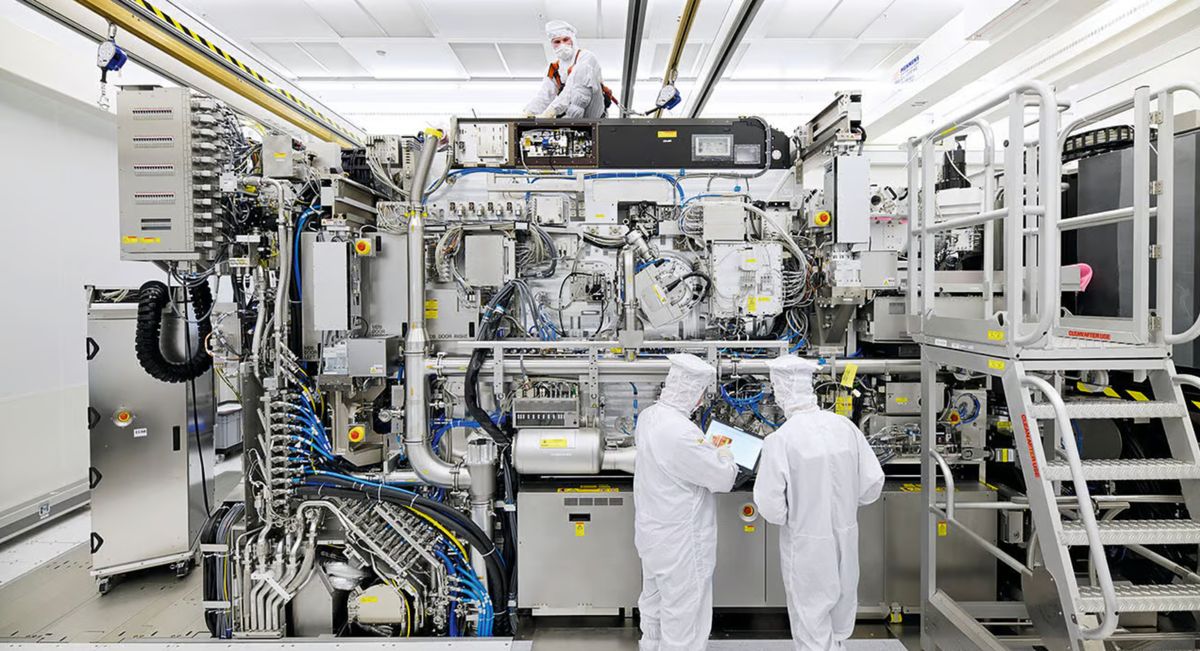Dutch Plan More Export Restrictions on Chip-making Machines

The Lede: In line with U.S. policies to cut off Beijing’s access to semiconductor technologies, the Netherlands has announced further export controls that will restrict the sale of more chipmaking machines made by Dutch company ASML starting in September
What We Know:
- Starting on September 1, ASML and other Dutch companies involved in manufacturing chipmaking machines that make the most advanced semiconductors will be required to obtain licenses in order to export them. The restrictions are expected to prevent shipments of three of ASML’s deep ultraviolet (DUV) lithography model machines, the TWINSCAN NXT:2000i, the NXT:2050i, and the NXT:2100i.
- ASML has said that the rules would not affect the company’s 2023 outlook. The Dutch firm ASM International, which specializes in photolithography machines and atomic layer deposition for microelectronics may also be impacted by the new rules.
- The Dutch government claims that the policy is ‘country neutral,’ but it falls in line with the larger move agreed upon with the U.S. and Japan to block China’s access to chips and related equipment due to their potential uses for military logistics and human surveillance technologies.
- The announcement of these restrictions follows similar measures from the U.S. that will further expand export controls on the sale of the most advanced chips used for AI technologies to China, which will impact major U.S. companies including Nvidia and AMD.
The Background: ASML is the world’s only producer of the extreme ultraviolet lithography machines (EUV) that make the most advanced semiconductor chips below the 7-nanometer level. ASML’s most modern equipment has been banned from export to China since 2019 and has never been sold there. The company has continued to sell lower-quality chip lithography systems to China, which accounted for about 15 percent of ASML sales in 2022. Taiwan Semiconductor Manufacturing Company (TSMC) and Intel are major customers as well. German companies provide essential parts to ASML, such as lasers and precision mirror systems from Trumpf and lenses from Zeiss. The European Commission recently published new measures regarding the ‘de-risking’ of supply chains and export controls. EU leaders are currently meeting to discuss the future of economic ties with China.
Likely Outcomes:
- The Dutch restrictions on sensitive technology exports may set a tone for other countries in Europe or at the EU level, though the Netherlands produces the most significant chip-related equipment. Though chips and related equipment remain at the forefront of the ‘de-risking’ trend, the Netherlands and European countries, in general, will likely continue to have economic ties with China in other industries in the near term.
- The Netherlands and the EU may also consider policies similar to those in the U.S. that aim to support companies in the chips industry amid the re-balancing of economic and supply chain ties with China.
- Japan, South Korea, and Taiwan may follow the momentum and explicitly impose such detailed measures on their exports of chip-related products. In these cases, economic ties with China in other industries and sectors will likely continue as the ‘de-risking’ trend takes form. China will have to find alternative solutions to both obtaining advanced chips as well as the sophisticated machines used to make those chips.
Quotables:
“We have taken this step in the interest of our national security. It is good that the companies concerned now know where they stand. This way they can adapt to the new regulations in time…We can tackle the most important vulnerabilities without an unnecessary disturbance of the global production of chips.” – Liesje Schreinemacher, Dutch Foreign Trade and Development Cooperation Minister
“We do not believe in ASML that decoupling is possible. We believe this will be extremely difficult and extremely expensive. The idea that we could go back to a little dark corner and do it all alone is most probably a very challenging concept.” – Christophe Fouquet, executive vice-president and chief business officer of ASML
"My observation is that people do not applaud it, do not like it, but also understand why the Netherlands is doing it. In addition, they also want to continue the technical dialogue, and I think that is a realistic question from the Chinese side.” – Wopke Hoestra, Dutch Foreign Affairs Minister
Good Reads:
Dutch semiconductor machine export restrictions to come into force in September (AP)
Dutch curb chip equipment exports, drawing Chinese ire (Reuters)
Dutch Restrict Chip Exports Amid US Push to Tighten China Curbs (Asia Financial)
Dutch slap new restrictions on chips exports to China (Politico)
ASML Hit With New Dutch Limits on Chip Gear Exports to China (Bloomberg)
High-tech export restriction preventing ASML from selling to China begins in September (NL Times)
Dozens of ASML shipments to China face tougher export curbs (FT)
ASML says decoupling chip supply chain is practically impossible (FT)
